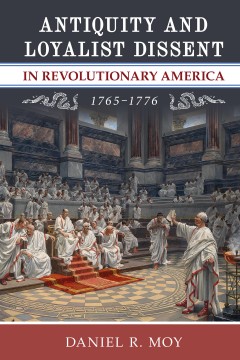Antiquity and Loyalist Dissent in Revolutionary America, 1765–1776
By Daniel R. Moy
Other Formats Available:
- About This Book
- Reviews
- Author Information
- Series
- Table of Contents
- Links
- Podcasts
About This Book
This book explores how the loyalist rebuttal to the American patriot movement during the decade leading up to 1776 derived much of its inspiration and rationale from the literature of the Greco-Roman world—the same repository of classical ideas and principles the patriots coopted to persuade their fellow countrymen to disavow the English crown and pursue independence. Although previous histories have described how the ideas of the ancient Mediterranean, transmitted through the Renaissance and Enlightenment writers, were important—even vital—to the revolutionary movement, few questions have been raised in the historiography concerning the loyalists’ political motivations and actions with respect to the ancient literary canon.
This study sheds new light on the pre-revolutionary controversy and pamphlet war in the colonies, examining those ideological currents, derived from antiquity, that informed both radical and conservative responses to the transatlantic crisis throughout the 1760s and 1770s. The same tradition of Western thought that inspired some British Americans to rebel against the mother country compelled others to remain loyal to the British system of government and fervently oppose the revolutionary agenda.
Classical republican ideas did not predispose British Americans to rebel against the crown. Rather, the decision to declare independence was the outcome of a highly contested ideological struggle waged between adversaries well-versed in the literature, motifs, and principles of the ancient world. Invoking the republican precepts of the Greco-Roman past, the loyalist rebuttal posed a significant challenge to the legitimacy and rationale of the colonial resistance. The fact the Whig-patriots were able to surmount these formidable obstacles demonstrates just how radical, in an ideological sense, the American Revolution truly was.
Reviews
"Taking Loyalists seriously, Daniel Moy illuminates their deep engagement with classical tropes to justify resisting the Patriot bid for power. In clear prose and with keen insights, Moy reveals the intellectual foundation and stakes of the conservative struggle to defend the union of the British Empire in an era of revolution."—Alan Taylor, author of American Revolutions
“Antiquity and Loyalist Dissent is an impressive and original addition to the literature on the classics and revolutionary America. Moy underscores the extent to which late-eighteenth-century classical America was no more inherently radical or republican than it was conservative or monarchical, and that antiquity provided a wealth of principles, motifs and imagery not only to Whigs but also to American Tories. An intellectual tour de force!”—Eran Shalev, Department of History, Haifa University
“At last, the book for which I have been searching for decades—a lucid, thoughtful, scholarly treatment of the role of the Greek and Roman classics in the American loyalist movement—has finally been published! This book fills a huge void in the intellectual history of the American Revolutionary era.”—Carl J. Richard, Department of History, Geography and Philosophy, University of Louisiana at Lafayette
“Antiquity and Loyalist Dissent is a balanced, nuanced, and groundbreaking account of the ideology of those who remained loyal to the Crown during the American Revolution. Convincingly demonstrating that their loyalty was grounded in adherence to classical republicanism, Daniel Moy has written a book that should be read by all who wish to understand American Tories.” —John Ferling, author of Whirlwind: The American Revolution and the War that Won It (2015)
“Denounced by victorious Patriots as enemies of American freedom, Loyalists have long been depicted as history’s villains, economically driven conservatives utterly lacking in noble aspirations. Daniel Moy’s impressively researched and gracefully written volume reminds us that Loyalist pamphleteers regarded themselves the intellectual descendants of ancient Romans and believed their self-governing communities safest within the British Empire.”—Douglas Egerton, author of Death of Liberty: African Americans and Revolutionary America
“In this fascinating study, Moy demonstrates that the American colonists who opposed the revolution of 1776 consistently referenced the institutions and traditions of the Roman Republic and the figures of Scipio, Cato, Cicero, Catiline, and Julius Caesar to articulate their case that loyalty to Britain was essential and just.”—Teresa Ramsby, Professor of Classics, University of Massachusetts Amherst
“A much overdue reassessment of the philosophical underpinnings of the Revolutionary War and the influence that classical Greece and Rome brought to bear upon Tory and Patriot alike.” —John Oller, author of The Swamp Fox: How Francis Marion Saved the American Revolution
Author Information
Daniel Moy is an Adjunct Professor at the University of Virginia’s Frank Batten School of Leadership and Public Policy. A retired Air Force Colonel, he served as an Assistant Professor at the United States Air Force Academy’s Department of History and received the Bronze Star for his command of counterinsurgency operations in Afghanistan. A graduate of the University of Oklahoma and the Harvard Kennedy School of Government, his research sheds new light on the American founding relevant to contemporary politics and civic leadership.
Series
Anthem American Reception Studies
Table of Contents
Acknowledgements; Table of Contents; Introduction; 1, The Appian Way Divided: The Rise and Fall of Britannia in America; 2, Civic Virtue: Antiquity in American Political Thought; 3, A Conspiracy of Catilines: Liberty, Tyranny, and the Loyalist Persuasion; 4, Countering an American Insurgency: The Language of Classical Loyalty; 5, J. Hector St. John de Crèvecoeur and the American Belisarius; Conclusion; Index; Bibliography; Index.
Links
Stay Updated
Information
Latest Tweets



